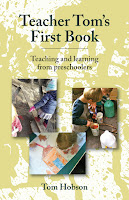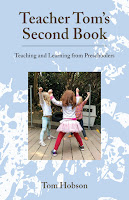Several of the kids were taking turns boasting about how strong they were.
"I can pick up this whole table!"
"I can pick up this whole school!"
"I can pick up this whole world!"
As their claims escalated ludicrously, some of their classmates called them out.
"No you can't!"
"You can't even pick up a piece of paper!"
"You can't even pick up a piece of toilet paper!"
It was all fun and games, of course, no one was serious. Then one of them said, "I can pick up the whole loft." The loft is a two level piece of furniture that stands in the corner of the room. I recall that when it arrived, decades ago, it came, ready-to-assemble, in cartons weighing a little over 250 pounds. I tossed this information out there, like a loose part, "The loft weighs more than 250 pounds."
The boaster paused, looked astonished, then said, "I guess I can't lift 250 pounds by myself."
A fellow boaster said, "Maybe we can lift it together."
The tone had suddenly changed from one of one-upsmanship to serious consideration of a job at hand. They agreed to try, approaching the loft with their muscles flexed, but they were unable to budge it.
Not stymied, they called out, "Hey guys! We need help!" and "We're going to lift up the whole loft!" As more and more children gathered, I began to get the idea that this might really happen. One or two of them could never manage it, but dozens, working together, likely could. What was the worst thing that could happen? It could topple over and land on the kids. They could succeed in lifting it, then drop in on their toes. I moved closer. As the children assembled, I called a couple of other adults over and we quietly strategized how we could make it safe enough, just in case.
At first, even with nearly twenty children, nothing happened. Their efforts were individual and uncoordinated. But they were still working on it.
"We have to lift at the same time!"
"We have to spread out!"
"We need more people under the low part!"
"I'll count to three!" "No, I'll count to three!" "Let's all count to three, then lift!" "Okay, guys, ready?"
They indicated their readiness with a sudden silence, then together they chanted, "One! Two! Three! Lift!" And the loft began to rise, all 250 pounds of it, hovering one then two inches off the ground. As agreed, the adults then stepped in and took much of weight as we helped them slowly lower it to the ground, cautioning about toes and fingers.
Sadly, this type of experience is all too rare in American schools, especially the farther one gets from the preschool years. Grades and scores and other assessments are individual things. Indeed, to achieve school-ish success in any way other than on your own is labeled as cheating and punished. Oh sure, there may be one or two tick boxes that rate a child's ability to cooperate with others, but no one takes those seriously. Teachers might assign a group project here and there, but we all know that the "smart" kids resent the "stupid" ones, concerned they will "hold them back" or not do enough of the work, taking relief in knowing that the grading, at least, will be individual. Working together to lift a loft, write a report, or solve a problem might be praised in the abstract, but every school child comes to know that at the end of of the day they will be judged not by what they have accomplished together, but rather by how well they compete against their classmates.
In school, to boast of one's prowess is no joke: it is the point.
People often try to make the argument that school must be this way because life is this way, but is it really? Yes, perhaps we do compete for jobs and promotions. There are some professions, like high-pressure sales jobs, in which employees find themselves pitted against one another, but even professional sports teams, like most employers, value teamwork above individual accomplishment.
But even if we stipulate that the work-a-day world has certain competitive elements, that hardly comprises most of what makes life worth living. Most of what we do in our homes, communities, churches, and with our friends involves coming together around common problems, opportunities, or projects. Democracy itself, if it is to work, is far more akin to lifting a loft than competing for grades. This is what school, if it is to truly prepare children for life, should be about: people coming together to lift the loft.
One of the great American myths is this idea of a solitary hero who single-handedly saves the day, but it has never happened outside of a Hollywood movie. No doctor saves a life on their own. No engineer builds a bridge without the support of thousands. No community has ever been kept safe except by the actions of the community itself. No one has ever lived a joyful life unless they have spent it accomplishing meaningful things, shoulder-to-shoulder with others. That is what I wish for the children I teach -- a life in community.
The moment the loft's long legs touched the ground, the children cheered. Spontaneously. For themselves. Together they had done something that had at first seemed like an hyperbolic boast. They hugged and jumped up and down, saying things like, "We did it!" These are the best educated people on earth.
******
If you liked reading this post, you might also enjoy one of my books. To find out more, Click here!
"Few people are better qualified to support people working in the field of early childhood education than Teacher Tom. This is a book you will want to keep close to your soul." ~Daniel Hodgins, author of Boys: Changing the Classroom, Not the Child, and Get Over It! Relearning Guidance Practices
I put a lot of time and effort into this blog. If you'd like to support me please consider a small contribution to the cause. Thank you!




